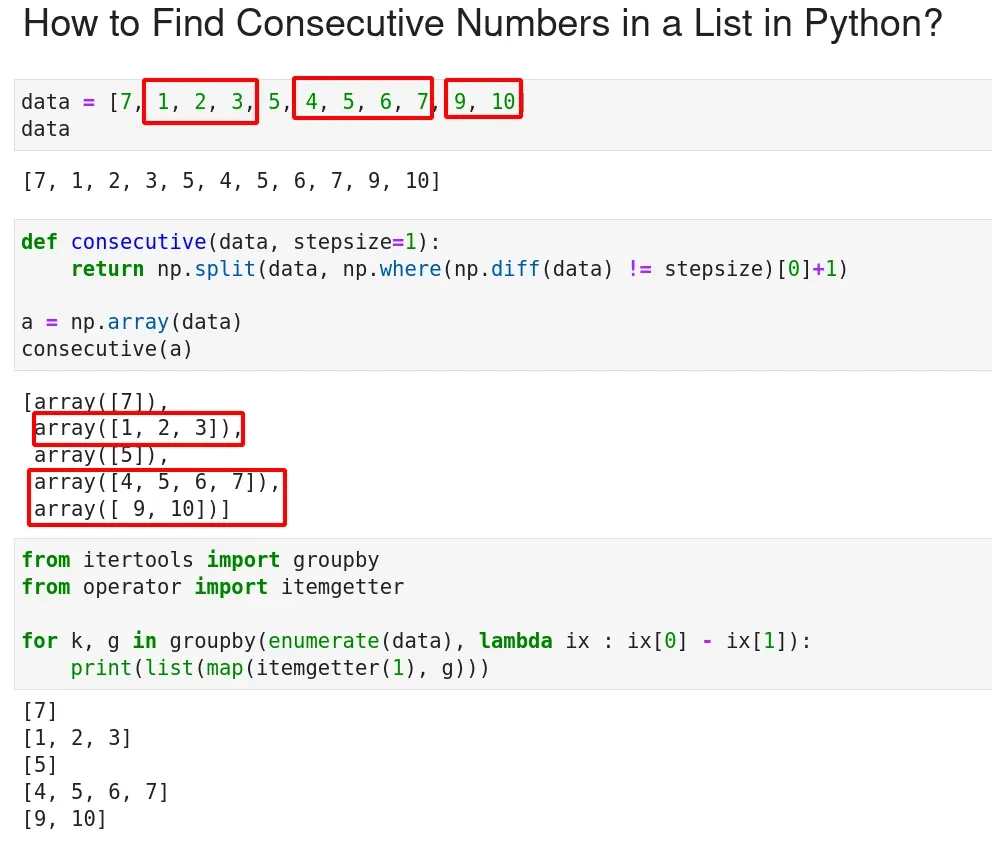To find consecutive numbers in a list in PythonWe can use different techniques. Below you can find 3 examples of grouping consecutive numbers in list/array in Python:

find consecutive numbers with numpy
My favorite solution is by module numpy we can detect consecutive numbers in array by:
def consecutive(data, stepsize=1):
return np.split(data, np.where(np.diff(data) != stepsize)[0]+1)
a = np.array([7, 1, 2, 3, 5, 4, 5, 6, 7, 9, 10])
consecutive(a)
result:
[7]
[1, 2, 3]
[5]
[4, 5, 6, 7]
[9, 10]
The code works as follow:
np.diff(data)- get difference of itemsarray([-6, 1, 1, 2, -1, 1, 1, 1, 2, 1])
np.where(np.diff(data) != 1)[0] + 1- get difference if different than 1
- extract index and add 1
- array([1, 4, 5, 9])
- split the array on those indexes
itertools + groupby to detect consecutive numbers
As an alternative we can use another solution based on itertools and groupby.
from itertools import groupby
from operator import itemgetter
data = [7, 1, 2, 3, 5, 4, 5, 6, 7, 9, 10]
for k, g in groupby(enumerate(data), lambda ix : ix[0] - ix[1]):
print(list(map(itemgetter(1), g)))
result:
[array([7]),
array([1, 2, 3]),
array([5]),
array([4, 5, 6, 7]),
array([ 9, 10])]
To find out how the code get consecutive numbers we can run this code:
for k, g in groupby(enumerate(data), lambda ix : ix[0] - ix[1]):
print(k, list(g))
which give us:
-7 [(0, 7)]
0 [(1, 1), (2, 2), (3, 3)]
-1 [(4, 5)]
1 [(5, 4), (6, 5), (7, 6), (8, 7)]
0 [(9, 9), (10, 10)]
So again we get the difference and group consecutive integers.
Python - find consecutive integers in list
Finally we can find a generic Python solution without extract imports. In this example we hold the consecutive numbers in list:
numbers = data
consecutives = []
current_consecutive = [numbers[0]]
for i in range(1, len(numbers)):
if numbers[i] == numbers[i-1] + 1:
current_consecutive.append(numbers[i])
else:
if len(current_consecutive) > 1:
consecutives.append(current_consecutive)
current_consecutive = [numbers[i]]
if len(current_consecutive) > 1:
consecutives.append(current_consecutive)
print(consecutives)
result:
[[1, 2, 3], [4, 5, 6, 7], [9, 10]]









